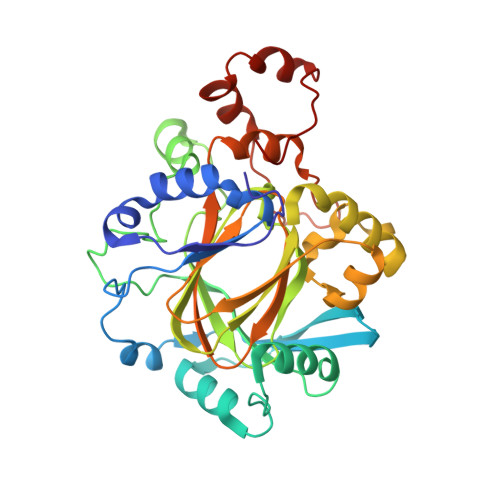A High-Throughput Mass Spectrometry Assay Coupled with Redox Activity Testing Reduces Artifacts and False Positives in Lysine Demethylase Screening.
Wigle, T.J., Swinger, K.K., Campbell, J.E., Scholle, M.D., Sherrill, J., Admirand, E.A., Boriack-Sjodin, P.A., Kuntz, K.W., Chesworth, R., Moyer, M.P., Scott, M.P., Copeland, R.A.(2015) J Biomol Screen 20: 810-820
- PubMed: 25755264
- DOI: https://doi.org/10.1177/1087057115575689
- Primary Citation of Related Structures:
4XDO, 4XDP - PubMed Abstract:
Demethylation of histones by lysine demethylases (KDMs) plays a critical role in controlling gene transcription. Aberrant demethylation may play a causal role in diseases such as cancer. Despite the biological significance of these enzymes, there are limited assay technologies for study of KDMs and few quality chemical probes available to interrogate their biology. In this report, we demonstrate the utility of self-assembled monolayer desorption/ionization (SAMDI) mass spectrometry for the investigation of quantitative KDM enzyme kinetics and for high-throughput screening for KDM inhibitors. SAMDI can be performed in 384-well format and rapidly allows reaction components to be purified prior to injection into a mass spectrometer, without a throughput-limiting liquid chromatography step. We developed sensitive and robust assays for KDM1A (LSD1, AOF2) and KDM4C (JMJD2C, GASC1) and screened 13,824 compounds against each enzyme. Hits were rapidly triaged using a redox assay to identify compounds that interfered with the catalytic oxidation chemistry used by the KDMs for the demethylation reaction. We find that overall this high-throughput mass spectrometry platform coupled with the elimination of redox active compounds leads to a hit rate that is manageable for follow-up work.
Organizational Affiliation:
Epizyme, Inc., Cambridge, MA, USA twigle@epizyme.com.




















